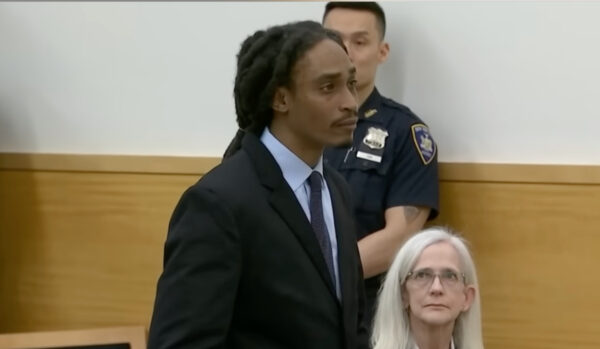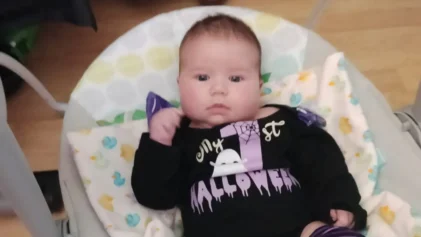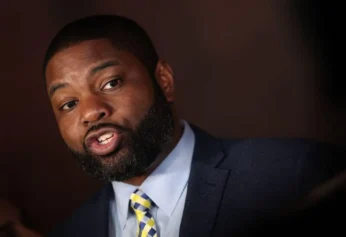A Black man who was wrongfully accused of murder and spent more than half of his life in prison is free following a review by the Brooklyn District Attorney’s Conviction Review Unit.
Authorities determined someone made a mistake when identifying Sheldon Thomas, then 16, as the killer of another teen in 2004.
On Thursday, March 9, Brooklyn district attorney Eric Gonzalez announced that — following a hearing where new findings were presented — Thomas, who today is 35, should be released from prison after spending nearly 19 years behind bars for a crime he did not commit, the Daily News reports.

Thomas was wrongfully convicted of the Christmas Eve murder of a 14-year-old boy named Anderson Bercy, despite maintaining his innocence.
A judge convicted him of murder, attempted murder and other charges, sentencing him to 25 years to life in prison. Thomas’ release comes after he served 76 percent of his minimum sentence.
New evidence shows that a witness identified Thomas after seeing an image of another Sheldon Thomas, according to Brooklyn district attorney Eric Gonzalez. A judge at the time indicated the image showed enough of a resemblance.
Thomas, Gonzalez said, “was arrested based on a witness identification of a different person with the same name — a mistake that was first concealed and then explained away during the proceedings.”
The borough’s top attorney said the prosecution working the trial was “compromised from the very start by grave errors and lack of probable cause to arrest Mr. Thomas.”
The New York Times reports that while investigators noted that the two men had the same name and had addresses in the same precinct, detectives knew early on that the person they had and the person they were possibly looking for were two different people.
In fact, the district attorney showed that the detectives had known Thomas from the community and “repeatedly harassed” him for months. The investigators became acquainted with the teen after he was arrested for pointing a broken gun at NYPD members.
The detectives locked in on Thomas when looking for the suspect in Bercy’s death. The conviction review unit report by the DA’s office showed that authorities prompted a witness to choose the wrong Sheldon Thomas’ photo before arresting the Sheldon Thomas they were after.
Brooklyn Supreme Court Judge Matthew J. D’Emic ordered him freed after the evidence was presented.
When given a chance to speak, Thomas said at the hearing, “Thank you, your honor, for allowing this to happen. I’ve waited a long time,” ABC 7 reported.
“All this time, they really had the wrong person,” Thomas said. “The real people are still out there.”
Thomas also shared that he’s “waited a long time for this day to happen, and there’s so many times that I was in my cell I would think of this moment — what I would say, who would be there. Right now, I’m just speechless.”
He did not speak a lot to the press after his release but instead left the courtroom with his grandmother. He only said to the media that he couldn’t wait to get home to eat some oxtails.
The police reports show three alleged gang members were arrested for the East Flatbush murder of Bercy and for injuring a second person. Thomas was among the three detained.
A witness told authorities that the suspects left the scene in a white vehicle, identifying two of the men detained as the shooters. The witness never fingered Thomas in the crime.
Detectives said Thomas became associated with the crime after their office received an anonymous tip. Even when detective Robert Reedy brought him in and showed him the photo shared with the witness, Thomas flat-out said it was not him.
The judge on the case still believed the resemblance was close enough, and the testimony about the detective about the “unknown callers,” the district attorney said.
A new prosecutor, Charles Linehan, said authorities have come to the “inescapable conclusion” that the police at the time made an arrest based on a photograph of a suspect that was not Thomas, adding, “defendant did not look like the other Sheldon Thomas.”
The Conviction Review Unit discovered Thomas “was denied due process at every stage, making his conviction fundamentally unfair.”
The unit also found “the errors undermined the integrity of the entire judicial process and the defendant’s resulting conviction.”
Thomas’ case cannot and will not be retried, according to the district attorney’s office.
This change in events opened up old wounds for Bercy’s family.
Still, the victim’s aunt, Edelyne Bercy, spoke to the press about what happened to Thomas, calling it “unfortunate,” saying, “Justice has to be done somehow.”
She also remembered her nephew, stating whoever killed him shot him one block away from his home, where he died on the steps. As immigrants, she said, the family had come to the city for a better life and that she was “shocked” to learn that he died.
“It’s something I will never, never forget,” she said.
Gonzalez and his team are calling for the dismissal of the original indictment that moved to steal so much of Thomas’ life — stopping him from going to college, learning a trade, or having a family like other men his age.
Gonzalez apologized to Thomas on behalf of the system that failed him when he met him in court.
“This is the first time in 25 years I’ve seen an erroneous photo identification used as the basis for an arrest that actually went to trial,” he said. “We must strive to ensure fairness and integrity in every case and have the courage to correct mistakes of the past. That is what we are doing in this case, where an extensive reinvestigation by my Conviction Review Unit revealed that it was compromised from the very start by grave errors and lack of probable cause to arrest Mr. Thomas.”
Since its mission was launched, the CRU has had 34 convictions vacated, including Thomas’.


